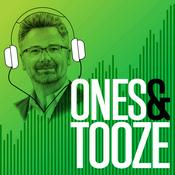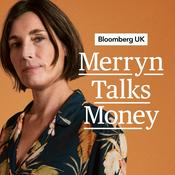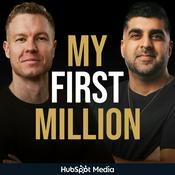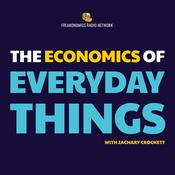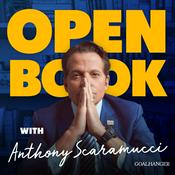121 episodes
Series 3, Episode 22: Why would anyone be a micromanager? with Professor Catherine Deen, University of New South Wales Canberra
28/1/2026 | 34 mins.A 2020 article by the polling firm, Gallup, argued that:
“The micromanager has become a bit of a boogeyman in the business world. Nobody wants to work for one. Few managers want to be one. Everyone has a horror story about one.”
To explore the topic of micromanagement and its implications I am delighted to be joined by Dr Catherine Deen.
About our guest…
Catherine Deen is a Senior Lecturer in HR and Organisation Behaviour at the School of Business, University of New South Wales Canberra. As an organisational behaviour researcher, Catherine has a growing reputation for excellent research in the areas of work-related intimate partner aggression, leadership, and the vocational experiences of vulnerable workers. Prior to entering academia, Catherine amassed more than 20 years of industry experience in educational administration, teaching, and research.
Since formally entering academia in 2018, Catherine’s research has been published in a range of top management journals.
To find out more information about Catherine and her research take a look at the following links:
www.catherinedeen.com
https://lead.fiu.edu/news/2024/my-way-or-the-highway.html
Hosted on Acast. See acast.com/privacy for more information.Series 3, Episode 21: Developing a theory of collective stupidity, with Professor Sir Geoff Mulgan, University College London
14/1/2026 | 34 mins.“Collective stupidity is fairly common in organisations. Firms full of very smart individuals who act in reckless ways that destroy them. Governments and nations that engage in acts of self-harm, descending into economic decline or civil war. Armies that repeat failed tactics. It’s easy to see collective stupidity as something others slip into because of their own idiocy or moral failings. But this perspective misses much. We are all party to such follies.”
So wrote our guest today, Professor Sir Geoff Mulgan, in a recent paper on the focus of our conversation: Collective Stupidity and its implications for individuals, organisations and society.
About our guest
Sir Geoff Mulgan CBE is Professor of Collective Intelligence, Public Policy and Social Innovation at University College London (UCL). Prior to that he was Chief Executive of Nesta, the UK’s innovation foundation, between 2011 and the end of 2019. From 1997 to 2004 Geoff had roles in the UK government including director of the Government’s Strategy Unit and head of policy in the Prime Minister’s office. From 2004 to 2011 he was the first Chief Executive of The Young Foundation. He was the first director of the think-tank Demos; and has been a reporter on BBC TV and radio
The article discussed in the interview is open access and is available here:
Mulgan, G. (2025). A Theory of Collective Stupidity in Organisations–and Possible Remedies. Organization Studies, 46(9), 1331-1335.
https://journals.sagepub.com/doi/pdf/10.1177/01708406251349313
Hosted on Acast. See acast.com/privacy for more information.Season 3, Episode 20: Why we need to rethink stardom, with Professor Ernest O’Boyle, Indiana University, and Dr Martin Götz, University of Zurich
10/12/2025 | 49 mins.A forthcoming article by our guests today – appropriately titled “Rethinking Stardom" - argues that:
Star performers are increasingly capturing the attention of both researchers and practitioners alike. However, studies on these uber-performers often employ disparate definitions, theoretical foundations and assumptions, and methods and analyses, which creates significant tension and confusion in the comparison of findings and the formation of a clear understanding of what star performance truly entails and its impact on individuals, teams, and organizations.
To better explore the concept of star performers in organisations I am delighted to be joined by the two authors of this paper: Professor Ernest O’Boyle, Dale Coleman Chair of Management and Professor at Indiana University - Kelley School of Business, and Martin Gotz, Senior Teaching and Research Assistant in the Department of Psychology at the University of Zurich in Switzerland.
The article discussed in the interview is available here:
O'Boyle, E. H., & Götz, M. (2025). Rethinking stardom: A relativistic approach to studying the absolute best performers. Annual Review of Organizational Psychology and Organizational Behavior, 13.
Rethinking Stardom: A Relativistic Approach to Studying the Absolute Best Performers | Annual Reviews
Hosted on Acast. See acast.com/privacy for more information.Series 3, Episode 19: Why leadership development is failing us, with Professor Moran Anisman-Razin, University of Limerick
26/11/2025 | 29 mins.According to Forbes magazine, in 2020 alone global spend on corporate training programmes, often focused on leadership development, exceeded $350 billion. Yet how effective, if at all, are these programmes? And are they perhaps just a massive waste of time and money? To dig deep into the question of why leadership development might be failing us I am delighted to be joined on the podcast by Professor Moran Anisman-Razin.
About our guest…
Dr. Moran Anisman-Razin, is an Associate Professor of Work and Organizational Psychology in the Department of Work and Employment Studies at the Kemmy Business School, University of Limerick. She is also a Visiting Research Scholar at the Behavioral Science and Policy Center, Social Science Research Institute at Duke University, USA and Faculty Affiliate at the Center for Innovative Leadership, Carey Business School, Johns Hopkins university.
Through her work, Moran explores questions of leadership in organizations and is particularly interested in examining leaders' perspectives and identities as shaping behavior, leader development, and exploring ways to make leadership development programs more evidence-based and rigorous.
The MIT Sloan Management Review article discussed in the interview - Leadership Development Is Failing Us. Here’s How to Fix It - is available here: https://sloanreview.mit.edu/article/leadership-development-is-failing-us-heres-how-to-fix-it/
A key article also referenced in the interview - Uncomfortable but Developmental: How Mindfulness Moderates the Impact of Negative Emotions on Learning - https://journals.aom.org/doi/abs/10.5465/amle.2023.0434
Hosted on Acast. See acast.com/privacy for more information.Series 3, Episode 18: Does the “beauty bias” impact leader emergence?, with Professor Stephen Courtright, Texas A&M University
12/11/2025 | 35 mins.In a forthcoming article now available, our guest today, Professor Stephen Courtright, along with co-authors tackle the question of the “beauty bias and leader emergence”. Or to put that into plain English: how important is physical attractiveness to leadership? While pop psychology might tell us one thing, what does the evidence actually tell us and why should we care?
About our guest…
Stephen Courtright is Professor of Management & Flip and Susan Flippen Endowed Chair and Founding Director of the Flippen Leadership Institute at Texas A&M University.
Stephen’s research focuses on organizational leadership, teamwork, and work-family dynamics, and has been published in a range of academic journals and has earned many international awards and been featured by outlets such as The Wall Street Journal, NPR, Forbes, Fox News, and Harvard Business Review.
The article discussed is available here:
Courtright, S. H., Thurgood, G. R., Liao, H., Morgan, T. J., & Wang, J. (2025). The Beauty Bias and Leader Emergence: A Theoretical Integration, Extension, and Meta-Analysis. Journal of management, 01492063251330199.
https://journals.sagepub.com/doi/abs/10.1177/01492063251330199
You can follow Stephen’s work and that of the Flippen Leadership Institute on LinkedIn - https://www.linkedin.com/in/stephen-courtright-54776325/
https://www.linkedin.com/company/flippen-leadership-institute/posts/?feedView=all
Hosted on Acast. See acast.com/privacy for more information.
More Business podcasts
Trending Business podcasts
About Brain for Business
The Brain for Business podcast takes the lessons from evidence-based academic research in the brain, behavioural and organisational sciences - neuroscience, psychology, behavioural economics and more - and brings them to life for a business and organisational audience. Over the series we will speak to a range of neuroscientists, psychologists, behavioural economists, researchers and organisational practitioners, and look at some of the key aspects of human behaviour relevant to business and management practice. In so doing, we will seek to understand not just the what but also the how and the why – and how it can be done differently Our overall goal? To build a bridge from research into the brain and behavioural sciences to practical, everyday insights and to help leaders at all levels within organisations enhance their effectiveness. Hosted on Acast. See acast.com/privacy for more information.
Podcast websiteListen to Brain for Business, Working Hard with Grace Beverley and many other podcasts from around the world with the radio.net app

Get the free radio.net app
- Stations and podcasts to bookmark
- Stream via Wi-Fi or Bluetooth
- Supports Carplay & Android Auto
- Many other app features
Get the free radio.net app
- Stations and podcasts to bookmark
- Stream via Wi-Fi or Bluetooth
- Supports Carplay & Android Auto
- Many other app features


Brain for Business
Scan code,
download the app,
start listening.
download the app,
start listening.



